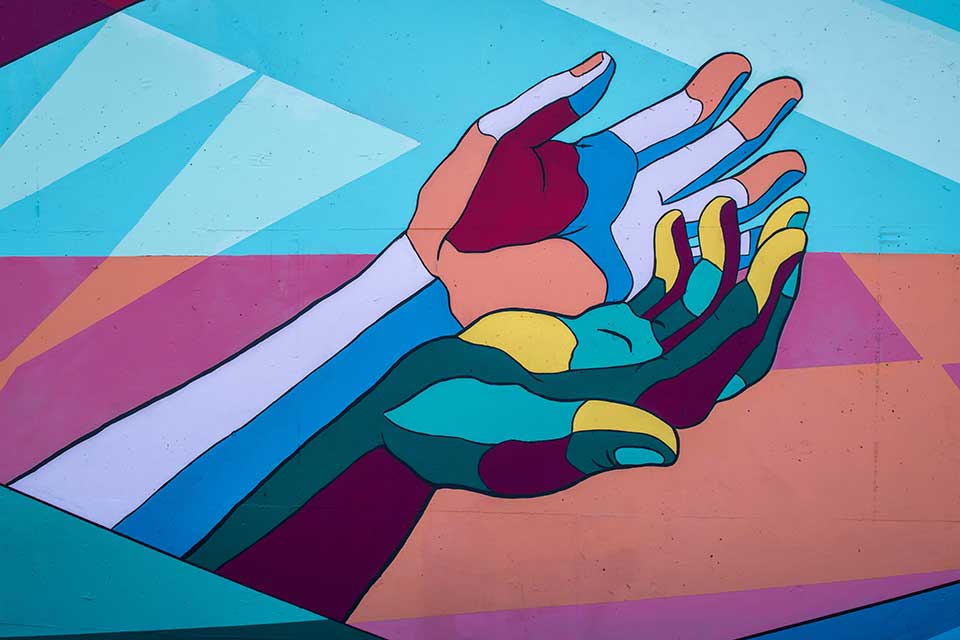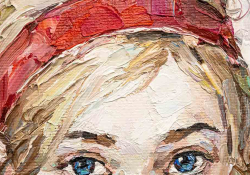To Wash Your Hands

A daughter faces a dilemma when the coronavirus creates an opportunity.
When I found out that the virus from China made its way to Puerto Rico, all my fears of becoming sick, the future of the business, and the consequences of quarantine were overshadowed by one single idea—how to infect my mother.
The situation was ideal because the government’s lack of order and leadership, along with the Health Department’s critical state, offered a scenario of minimum oversight. The reigning chaos was in my favor.
The reigning chaos was in my favor.
However, things at my parents’ house were the opposite—everything was done in an orderly fashion. Breaking such discipline wouldn’t go unnoticed. Even worse, to achieve my goal, I had to overcome two great obstacles—my dad, who would never allow this, and my sister, Lucina, who, although reluctant, was persuadable. I decided to call her.
“How are you, guys?”
“Nena, in survival mode.”
“Lucina, I was thinking the pandemic offers us a great opportunity to solve Mamamí’s situation.”
“Boy, you don’t give up. You’re still on that subject?”
“Of course. I believe it’s the perfect moment. Coronavirus deaths are rising. Mamamí’s would not attract the attention of the authorities. And if I could find someone to sign a death certificate, we wouldn’t even have to deal with the morgue. Besides, she has asthma, a heart condition, high blood pressure, and is a little overweight. No one would be surprised by her death. What do you think?”
“I don’t want to talk about it.”
“Lucina, we decided on this a long time ago. Tell me, are you having second thoughts?
“No. I know it must be done, but I wouldn’t dare.”
“That’s where I come in, chica, but if I need you, you can’t back down.”
“You mean help you? Oh, no. I just can’t.”
“I mean to keep an eye on Papamí, not the other thing.”
“Oh, all right, I can do that.”
“So, you agree.”
“Well, if there’s no other choice . . .”
“I’ve been looking for a method that wouldn’t arouse any suspicion, and this situation presented itself. Let’s take advantage of it.”
The first step was to find someone to inoculate her with the microorganism. It was essential that this person be an asymptomatic case, because, with no cough or fever, it would escape my father’s watchful eye. Furthermore, this unwitting pawn must not know about being a virus carrier, so neither he or she, nor us, would suffer the consequences of such an act.
I contacted Carmiña, a colleague from when I worked as a medical technologist, to find out about coronavirus testing and the contact-tracing system. In this record is kept personal and residential information of all infected cases. In its files, I might find my unsuspecting slayer.
Nevertheless, the conversation was quite different from what I expected. The woes she told me began with the resignation of the state epidemiologist after having said that Italy was next to China, and that the virus would not reach Puerto Rico because we were too far from Asia. The adversities continued with the fact that the secretary of health decided not to find a substitute amid a pandemic that became worse upon a failure to trace positive cases. Facing a lack of leadership, private labs opted for preparing their own records. Some used Social Security numbers, others name and last name, yet others used both last names. This made the follow-up of patients impossible.
To make things worse, some positive cases were duplicates or even triplicates, because patients were able to get IgM, IgG, and PCR tests at different locations, thus producing three positive cases from a single patient.
In conclusion, there was no reliable tracing, and, without it, I would not find an asymptomatic person. I spent a couple of days discouraged because I could not figure out how to infect Mamamí. Then I realized it was a matter of getting an infected object and exposing her.
I spent a couple of days discouraged because I could not figure out how to infect Mamamí.
I decided that I should visit Carmiña to get tested. I would arrive at the lab late, when there are only a few employees, and stay for a chat. We technicians spend so much time working alone, concentrated and silent, that we take advantage of any small chance to socialize we can find.
The day came, and I prepared my purse with the necessary items. I made it to the lab’s reception desk, and Carmiña came out to greet me. She wore a disposable robe, a facemask she took off to smile at me, and a plastic face shield. At the collection area, she took out a hyssop—a large, sterile Q-tip—and inserted it up my nose. She twisted it for ten seconds and put it in a cooler.
At that moment, I was supposed to leave, but merely commenting on how sloppy the government was acting was enough. Carmiña began analyzing the island’s situation. I got her completely by offering her a piece my sister’s famous pistachio cake. She squealed with joy and invited me into the employees’ private room.
There, I was able to change the topic to a fictitious lab article I was supposed to write. Would it be possible to look around the work area?
“Of course you can!” she answered trustingly.
I was gradually treading forbidden ground. I had planned to go to the restroom so as to separate myself from her, but it wasn’t necessary. She had to leave me alone to answer a phone call.
I approached the place where Covid-19 tests were processed. There were plenty of discarded swabs in the orange biohazard bag. I opened my purse, took out a large Ziplock, and left it wide open over the table. I put on some loose gloves as it was the most convenient thing in order to work quickly. I held my breath, took a handful of swabs from the trash can, and placed them in the bag. Quickly, I put on a new pair of gloves, sealed the bag, dropped it inside my purse, and disposed of the gloves. I looked up, searching for Carmiña. We were separated by worktables that blocked the view.
In a hurry, I approached the sink. I stepped on the pedal that turned the water on, moved my hand to activate the soap dispenser, and washed my hands and face thoroughly. Finally, I exhaled. When I was drying myself with a paper towel, I heard her coming.
“Being here makes you want to wash your hands often, huh?” I agreed with a smile. “I already got used to not touching my face. It’s a great exercise for developing willpower.”
“That’s right. The challenges we are facing have forced us to behave in ways we never thought possible. Humans can get used to anything.”
“But not us. We are the resistance!”
I said goodbye to Carmiña, happy to visit with her. She was a warrior and reminded me why I had to accomplish my objective.
On the way to my parents’, I called Lucina.
“I have everything. Meet me there so you can distract Papamí.”
As I was driving, I asked myself how to expose Mamamí to the coronavirus.
Would it be enough to touch the infected material and rub my fingers on her eyes, nose, and mouth? Or maybe something more direct, such as inserting a few infected swabs up her nose?
I parked on the carport and felt my hands trembling. I inhaled deeply to calm down. I had obtained an infallible weapon; there was only one more step left. I couldn’t cower now. I needed to hang on to the façade of detachment I faked when it came to Mamamí’s situation.
As I stepped out of the car, my eyes became watery. This weakness bothered me quite a bit. If I did not maintain control, Papamí would notice and everything would be ruined.
I went into the kitchen, purse in hand. Gave Lucina a forced smile that didn’t work. She was already crying. This affected me, so I had to return to the car terrace. To overcome my emotions, I closed my eyes and remembered who my mother was: a strong woman who laughed heartily, commented eagerly on many topics, treasured friendships, planned trips, worked and discussed legal cases, condemned inequity, and supported causes that mattered to her.
I saw her hug her grandchildren, read a book, listen to classical music, cook rabbit fricassee, and curse if anything went wrong. I heard her call me over the phone and ask me about the news article she had sent me so we could talk about world events later. I felt her rage upon claiming rights for women, for the poor, for the oppressed, for Puerto Ricans.
I took her hand so delicate and thin, like onion skin, and could almost feel her caress, that’s how much I yearned for it. Then her hug wrapped me with the warmest maternal comfort. I recalled the note she wrote me when she lost her ability to talk. Spelling and syntax errors, so uncommon of her, revealed the deterioration in her brain. Then came the cruel manner in which all her senses stopped working, turning her into an absent being, unable to express pain, joy, hunger, or cold.
She was reduced to an arthritic, motionless shell, subject to the treatment of strangers. Women who had to invade her privacy to clean her, dress her, lie her down, or feed her. She was a surviving mass of flesh and bone. Did I have to receive a request or a signal from her aimless gaze or her twisted hands to know what was required? It was not necessary. I was a beloved daughter, and I knew my mother’s heart. That was why I had to regain my composure and act. I couldn’t do less for her.
Still in the carport, I wiped my face, blew my nose, and went in with a smile. I kissed Papamí, and I told myself I was not like Judas. This would hurt, but I was doing it for her. With Lucina by my side, we walked into her room.
“Tell Papamí and the nurse that you need help screwing the safety handles in the shower because they are loose. While they look for the tools, I’ll finish.”
Lucina called them, and, in a matter of seconds, Mamamí and I were alone. I looked at her lost green eyes. Was there a piece of my mother left in there? So many times, I had come close to her and whispered, “Mamamí, we are at peace. Papamí is fine, we’ll take care of him. If you have to leave this body, you can go now.” Night after night, I prayed for her death, but still she breathed, ate, and defecated.
I went to the shelf and grabbed a pair of gloves and a mask. I put them on and took out the plastic bag from my purse. I opened it and passed my fingers over the infected material. They had to have a very high viral load. Enough to free Mamamí from the hell she had been living in for ten years.
As I turned, I started crying. I did not want to see my mother in this condition; neither did Lucina. I remembered Papamí’s resistance to my proposal—“Your mother always feared death, are you sure that’s what she wants?” The echo of his warning reverberated in my head. Did my mother prefer this cruel existence to death’s unknown?
I looked at my hands. They were murder weapons. Tears came down my face and fell on the floor. I heard a sigh at the door and looked up. It was my sister.
“Don’t do it.”
I looked at her, thankful. Hearing her plea rescued me because, as much as I wanted, I couldn’t do it. I didn’t have the courage to kill my mother. My sister pushed the door open. I followed her to the restroom. She opened the faucet. I washed my gloved hands with plenty of soap. I went back to my purse, retrieved the Ziplock, and took it to the restroom. I washed the bag exterior with soap and then discarded it in the trash. I took off my mask and gloves and threw them away. I washed my hands and face for a long time. I got a plastic bag to put my purse in. I sealed it.
We walked in an embrace up to Mamamí’s bed. We lied next to her and cried because our orphan condition was misunderstood. How I hated people who said, “Thank God you still have her with you.” They did not know the torture of having her this way.
We remained next to that inert body. Only her breath was a sign of life.
* * *
From the door, their father observed them. He went to the restroom and picked up the trash can bag with the viral contents. He put it in another bag, closed it with a knot, and took it to the underground garbage can in front of the house. He washed his hands. He returned to his room and lay on the bed.
Disappointed by his daughters’ lack of courage, he cried himself to sleep.
Translation from the Spanish











